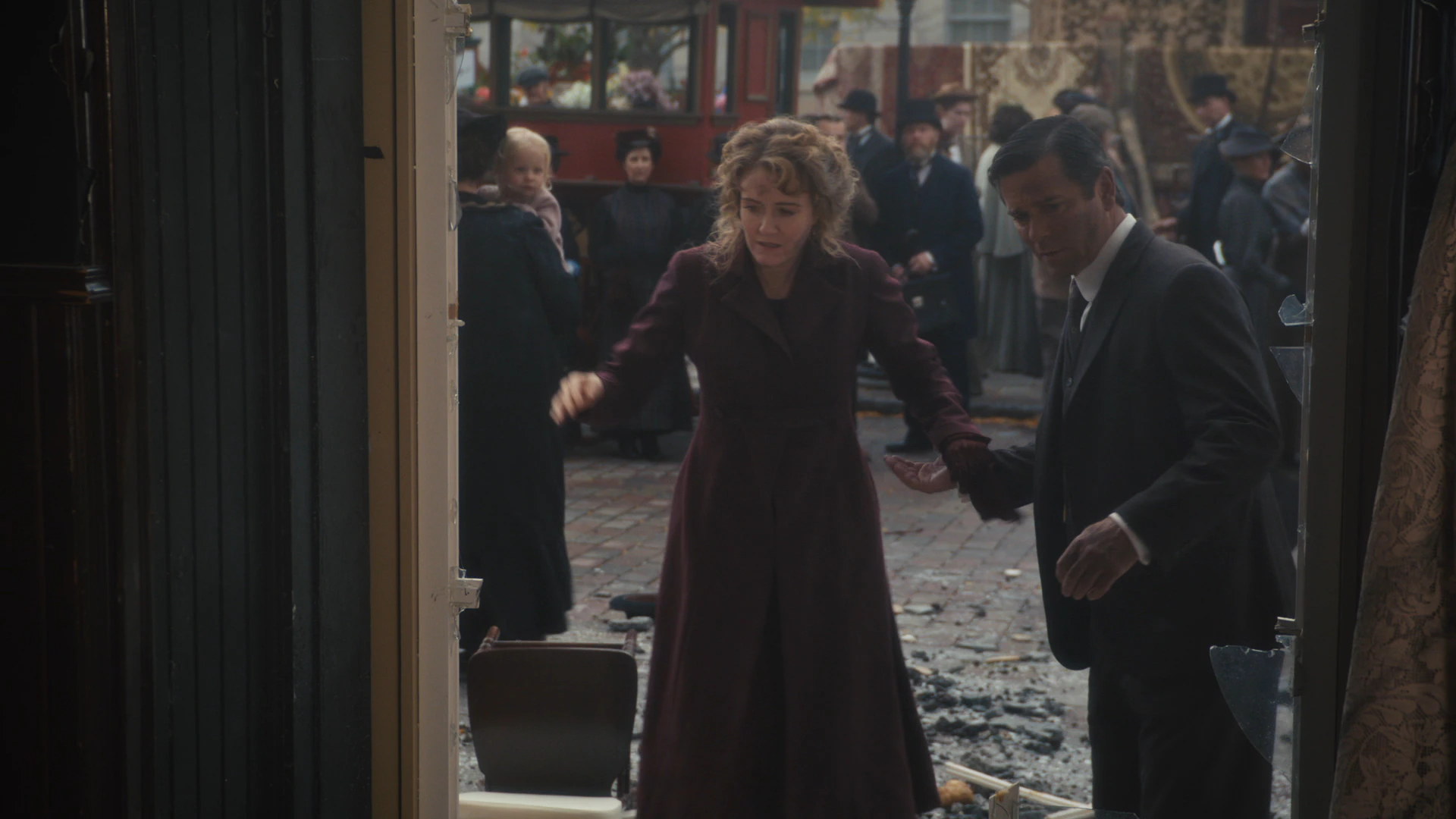S18 E11 – Bombshells
Shattered Windows, Shattered Lives

Spoiler Warning: Do not read on if you haven't watched this episode!!
Filled to the brim with authentic historical details, Bombshells explores an age-old yet still relevant question: Does the end justify the means? Wrapped up in an inventive murder mystery, this episode debates whether violence is acceptable or indeed necessary to bring about social change, and whether it even works. Underscored by the subplot, it delves into the underlying issue: the law is not equal for all.
While Murdoch Mysteries has tackled the women’s rights movement before, this time it’s personal when a suffragette bomb goes off in London, England, just as William Murdoch (Yannick Bisson) is walking by with his wife, Dr. Julia Ogden (Hélène Joy), and daughter, Susannah (Kennedy Bre Hall / Quinn Rae Hall). Although a little worse for wear—Hélène Joy particularly stands out in expressing shock, disbelief, and panic—they immediately switch to investigative mode. Julia recognizes the victim, Alice Dewhurst, as a suffragette, and identifies the bomb, which was filled with hatpins, as a calling card for the suffragettes. Meanwhile, Murdoch refreshingly does not get into a pissing match about jurisdiction with London Police Inspector, and proud owner of magnificent mutton chops, Dodd (Robin Wilcock).
Smack Dab in the Middle
Dodd makes the first of many mentions of historical facts as he tells Murdoch about a bomb that was found outside the House of Commons about a month ago. In February 1913, a bomb was indeed discovered on a window ledge outside the House of Commons. When examined, it was found to contain hatpins—a deliberate choice that was symbolic since hatpins were a common women’s accessory at the time and had been used by suffragettes for self-defence against police and hostile crowds. Writer Noelle Girard rather brilliantly takes these historic events and places Julia smack dab in the middle of them, and she does so in a way that builds on everything that has been established about the character over a long period of time.
It should come as a surprise to no one that Julia has become involved in the suffragette movement during her time in London. What is a little surprising is that she has chosen to participate in an orchestrated act of civil disobedience, smashing hundreds of windows with toffee hammers (another reference to a historical fact). Then again, Murdoch (and we viewers) didn’t think she’d stop getting into trouble just because she wasn’t in Toronto anymore, did we? She’s been in jail more times than I can remember, fighting for her convictions. What’s also surprising, though, is that she felt she had to lie about this, and continued to do so, even when Mrs. Caverton of the Anti-Suffrage League intimated that she knew about Julia’s involvement with the suffragettes. Mrs. Caverton, by the way, just loves outing Julia and delivering one of the title bombshells to Murdoch: Oh, dear. You really have no idea. At least Julia has the grace to look contrite when Murdoch confronts her.
Will Violence Further the Cause?
Smashing some windows is as far as Julia is willing to take it. When Murdoch tells her, I don’t want you involved in this any longer. I’ve read all about the prison hunger strikes, the force feedings, she responds, I’m trying to put a stop to that, working with the lawyers on a bill to stop the brutalities. She promises to steer clear of any more violence.
Like the historical suffrage movement, Julia’s London friends are divided about the most effective methods in the fight for women’s voting rights and grapple with the tension between achieving a desired result and the means used to attain it. Much like Lucy Renshaw (Zoie Palmer), some suffragettes advocated for more militant actions after years of what they viewed as ineffective peaceful protests: we need deeds, not words. Still, most suffragettes continued to employ peaceful protest methods, including demonstrations, petitions, and political lobbying. Historians still debate whether the bombings and violence helped or hindered the suffragette cause. This Murdoch Mysteries episode does not firmly land on either side of that fence, although it is interesting to note that the imprisonment and force-feedings made Christabel Abbott (Seana McKenna) hard-hearted and gave her a motive for murder, especially considering that she used to be armed only with Christabel’s simpering poems. In the end, it doesn’t even matter, as cynical politician Lord Lancen (Richard Waugh) says: Did you really think that killing the prime minister would advance women’s suffrage? Don’t be a fool. I did it for myself. I don’t care a jot for those damn suffragettes.
A Woman’s Rights
Back in Toronto, meanwhile, Violet Hart’s (Shanice Banton) past finally catches up with her in a subplot that seems unrelated to the main events in London, but, on further reflection, cleverly underscores the theme of the struggle for women’s rights. In a slow burn of a plot development, her husband, John Newman (Allan Cooke), shows up in the morgue and demands that she return with him to Cincinnati. Now, viewers may be forgiven for not remembering—or even knowing—that she has a husband, as this was mentioned only in passing by Violet’s father three years ago. But here he is, and it becomes immediately clear why Violet ran away from him all those years ago. Twenty years her senior, he’s a quietly menacing sort who is in cahoots with her father and doesn’t know how to take ‘no’ for an answer.
Shanice Banton does a great job in all her scenes: with Newman, she looks like that sixteen-year-old girl again who ran away; with Effie Crabtree (Clare McConnell), she appears afraid as she finds out that, as a woman, she essentially has no rights; and with Isaiah Buchanan (Mark Taylor), she looks mortified and ashamed as her fiancé finds out she’s already married. Based on what we’ve seen from Miss Hart in past episodes, I half-expected her to simply kill her husband, but instead, she seeks legal advice from Effie Crabtree and, learning that the law is not equal for all, seems to acquiesce. Thankfully, Isaiah is not above using a bit of violence and forces Newman to sign a petition for divorce. Just like the more militant suffragettes, he is just doing what I had to do to protect my girl.
Some Plot Problems
Despite the wonderful exploration of the theme, and perhaps even as a result of the focus on theme rather than plot, there are some problems with the story. For starters, in a city with a population of over 7 million people, Julia just happens to be caught in a bombing and even knows the victim. What are the odds? Then, when did Miss Renshaw have time to send a note to Mrs. Caverton? She only found out during the impromptu meeting that she wouldn’t be the one to speak with Prime Minister Asquith (Dennis Cutts), and Lord Lancen (Richard Waugh) was assaulted by Mrs. Caverton after that very meeting. Additionally, it was pretty stupid—and mighty convenient—of Christabel Abbott to leave her notebook behind. And where did Inspector Dodd come from all of a sudden? How did he know to be at the PM’s meeting? Still, these are all minor points in an episode that very deftly weaves history and thematic exploration into a character-driven plot. It also shows what a formidable duo Murdoch and Ogden still make and ends on a note of hope: I hope you’ll be coming back home soon. Yes, I will. Promise.
Bits and Bobs
This Episode's Hat:



